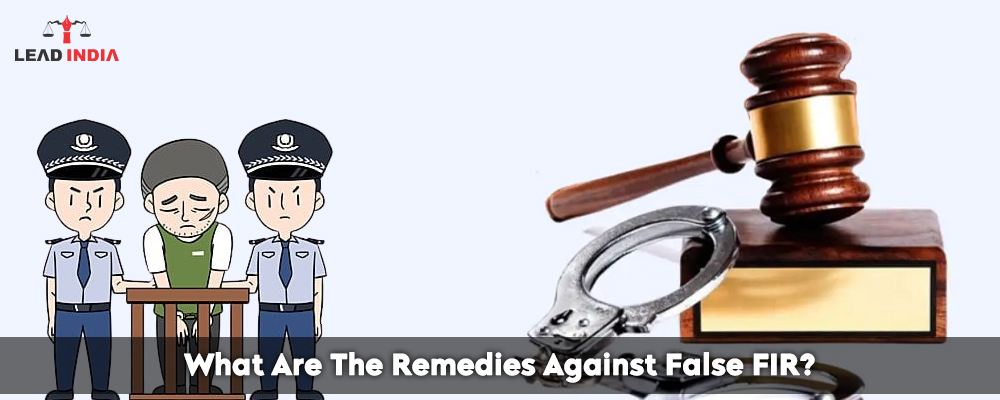A First Information Report (FIR) is a written record create by police when they receive information concerning the commission of a cognizable offence. It is a report of information that reaches the police first in time, hence it is name as First Information Report. It is typically a complaint file with the police by the victim of a cognizable offence or someone acting on his or her behalf. Anyone may report the commission of a cognizable offence, either orally or in writing.
Remedies against false FIR
There are certain remedies available to victims against the false FIR. Let’s discuss these:
- Remedies available before arrest is make: If the false FIR has been register and the arrest has not been make, then the victim can approach the Session Court or the High Court for anticipatory bail. Under this bail, the non – bailable offence is treat as bailable offence and if the arrest is make, the person could be able to take bail after giving the bail amount. Section 482 of BNSS talks about anticipatory bail. Under this, the court will consider several factors for determining the anticipatory bail and may impose conditions upon the applicant while granting the bail.
- Remedy after filing Chargesheet or after making arrest of the person: The High Court may hear a victim’s appeal to quash a fraudulent FIR filed against him/her under Section 528 of BNSS. This provision grants the High Court with inherent powers. This section does not provide any inherent power rather the High Court has inherent power, this section only declares it. The purpose of inherent power is to avoid any abuse of the process of court or to secure ends of justice. There are different stages when this application can be file. The victim can approach the High Court before filing the Chargesheet. If the false FIR violates the principle of natural justice and results in a terrible miscarriage of justice for the victim, the High Court has the authority to punish the police officer or make specific directives to such officials. If the police have filed the Chargesheet and the case has been commit to the sessions judge, then the victim can file an application so as to get discharge from the offence.
- Writ Petition: The victim can file the writ petition before the High Court under Article 226 of Indian Constitution. The victim can file two types of writ. The writ of Mandamus can be issue against the police officer that has lodged the FIR. The purpose of the writ is to give directions to the police officers to perform their duty in a lawful manner. The High court can issue the writ of Prohibition to the subordinate court where the trial of the victim is being conduct. It is issue with the purpose to stop the proceedings in the subordinate court.
Need A Legal Advice
The internet is not a lawyer and neither are you. Talk to a real lawyer about your legal issue

Remedies available after being acquit of false charge
- Under section 217 of BNS, the person against whom the false FIR has been register can file a complaint with the police officer with whom the false FIR has been register. This complaint can only be file after the victim has approached the High Court to have the fraudulent FIR invalidate, and the court has quash the FIR, or the victim has been dismiss or cleared by the High Court. This Section comes into action when a person gives misleading information to a public servant, leading him to do an act that, under the requirements of law, the such public officer would not have done, or convincing him not to do the act.
- The person who has filed false FIR can be hold guilty under section 248 of BNS which deals with false charge of offence make with the intention to injure. The victim can approach this section only after he has applied before the High Court for quashing a false FIR and the High Court has quashed it. The person can be hold liable to punishment under this section.
- The victim can claim compensation for accusations without reasonable cause under section 273 of BNSS against the person who had lodged the false FIR. The victim can claim under this section only after the magistrate acquits him of the false charges.
It has been seen that the purpose of false FIR is to humiliate a person. In such circumstances, the victim is view as humiliating and disgraceful by society, and he or she is subject to the humiliation of character assassination regardless of whether the false case has been dismiss or he or she has been acquit. The victim can file a civil suit under section 19 of CPC claiming compensation for defamation. He can even file a criminal suit of defamation under section 356 of BNS. The person will be liable to imprisonment under this section.
For any legal help, contact lead India. We provide free online legal consultations, in addition to a variety of other legal services tailored to meet your needs. On our platform, you can talk to lawyers. You can freely ask any legal question. We provide the solutions to your legal problems.





 Talk to a Lawyer
Talk to a Lawyer